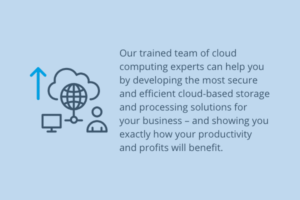 How you decide to host your CRM can impact both the profits and productivity of your organization.
How you decide to host your CRM can impact both the profits and productivity of your organization.
Harnessing the Power of Data for Your Business
Recapping from our previous article on CRM basics for small businesses, your customer relationship management platform handles and processes large amounts of critical and sensitive business data.
At any given time, your CRM will maintain information about leads, contacts, and customer interactions that have taken place during the sales and marketing process.
 Depending on your industry, you may retain customer service and support data from customer inquiries, support tickets, and service interactions gathered from your helpdesk and customer service software.
Depending on your industry, you may retain customer service and support data from customer inquiries, support tickets, and service interactions gathered from your helpdesk and customer service software.
CRMs can hold financial data about customer billing, invoicing, and payment history collected through accounting and financial management software.
Sales teams may monitor customer interactions on social media platforms, such as Twitter, Facebook, and LinkedIn through social media monitoring tools provided by your CRM.
Your CRM may track customer interactions with your website, such as page views, clicks, and session duration through web analytics tools.
Storing and processing this amount of data takes a lot of infrastructure, so it’s important to understand what options are available to keep your overhead low and your information accessible wherever your team needs to access it.
Where Should You Host Your CRM for Maximum Efficiency?
 Whether it is better for your organization to host your CRM system onsite or in the cloud depends on a variety of factors, including the specific needs of the business and the resources available.
Whether it is better for your organization to host your CRM system onsite or in the cloud depends on a variety of factors, including the specific needs of the business and the resources available.
Hosting a CRM system onsite, can offer several benefits but the most significant is the ability to have full control over the system and the data it contains.
Many highly regulated businesses believe that by maintaining their data at their location ensures that the data is kept secure and in compliance with regulatory requirements. Native hosting may convey benefits of customization and integration with other applications in the organization.
Your information technology needs will drive demand in both capital expenditures and human resources. To host a large database onsite will require upgrades to hardware and software as well as trained professional staff to maintain the system and respond to problems when they arise.
On the other hand, hosting a CRM system in the cloud can offer organizations of all sizes benefits as well. One of the main advantages of a cloud-hosted CRM is the scalability and flexibility.
Cloud hosting lets organizations easily scale up or down as needed and on demand without having to worry about the underlying infrastructure since it is maintained by a third party. Since the cost of maintenance and updates are handled by the cloud provider, organizations can focus their resources on their core business and growth initiatives.
Additionally, a cloud-hosted CRM can also be accessed from anywhere with an internet connection. which can be especially useful for businesses who still have remote employees, multiple locations, or hybrid workplaces.
How to Choose the Right Data Solution for Your Organization
 Ultimately, the choice between hosting a CRM system onsite or in the cloud will depend on the specific needs and resources of your organization. Businesses should always evaluate their specific needs, such as security, compliance, scalability, and budget before making a decision.
Ultimately, the choice between hosting a CRM system onsite or in the cloud will depend on the specific needs and resources of your organization. Businesses should always evaluate their specific needs, such as security, compliance, scalability, and budget before making a decision.
Interested in finding out how your most critical workflows would perform with the power of an award-winning cloud hosting provider hosting your data in a secure, compliant data center?
Our trained team of cloud computing experts can help you by developing the most secure and efficient cloud-based storage and processing solutions for your business – and showing you exactly how your productivity and profits will benefit.
Let us demonstrate exactly what Cyberlink can do for you – using your own data and workflows.

